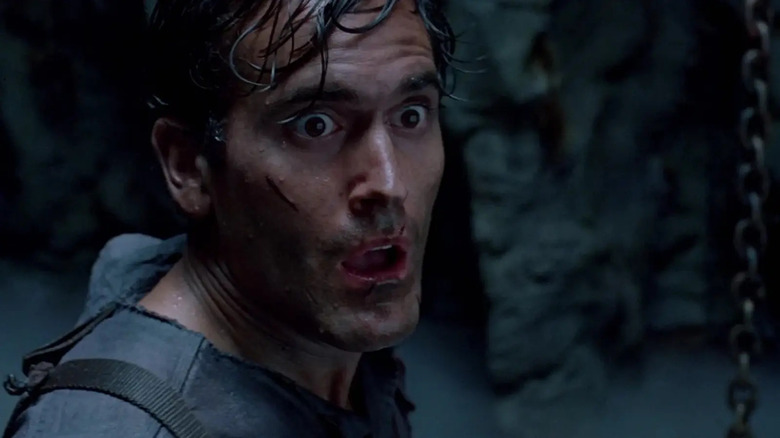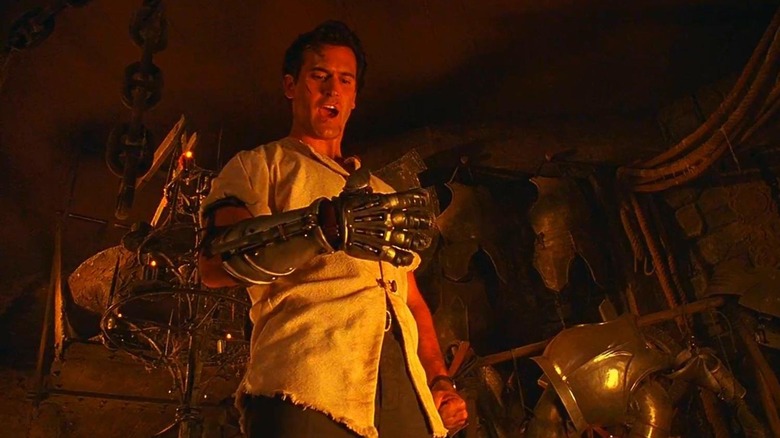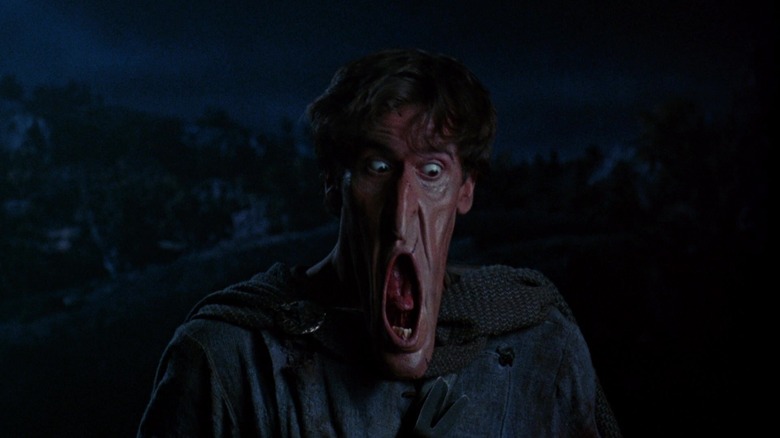Why Sam Raimi's Army Of Darkness Dropped Evil Dead From Its Title
The journey to "Army of Darkness" is a little circuitous, so follow me for a moment.
Sam Raimi's rise to fame is inspiring for all ambitious young filmmakers who don't mind freezing their butts off at remote cabins, spraying red-color corn syrup all over their friends. The making of "The Evil Dead" is a well-known tale to horror hounds everywhere. The young filmmaker, with his actor buddy Bruce Campbell, wanted to make a horror movie, but had no money to do so, being working class kids from Detroit. He and Campbell begged just about everyone they knew for funds, and eventually scrapped together $375,000, juuuust enough to make a spooky, gory cabin-in-the-woods movie. They shot in 16mm film on rented cameras.
The film crawled its way onto screens, and made a massive $2.4 million. Overseas, it became a notorious sensation, making $27 million (!). Raimi was on his way. In 1987, he energetically made a sequel/remake of "The Evil Dead" called "Evil Dead 2: Dead By Dawn." It had the same story as the first, and Campbell still starred, but it was more comedic — downright sillier — than the first. "Evil Dead 2" was made for an extravagant $3.5 million.
Sadly, "Evil Dead 2" wasn't the sensation of the first, only earning $5.9 million. Critics did like it, and it's considered by horror nuts to be one of the best movies of all time, but technically it was a bomb. No one cared that they both slowly made their fortunes on home video.
It was for this reason that the follow-up film, 1993's "Army of Darkness," was not called "Evil Dead 3." In a 1992 issue of Cinefantastique Magazine, Sam Raimi's longtime producer Robert Tapert talked about "Army of Darkness" and how the "Evil Dead" movies proved to be a detriment for it, in a marketing sense. "Army of Darkness" was distributed by Universal Pictures, a major studio, and they wanted the "Evil Dead" associations stricken from the title.
Universal Pictures wanted to distance Army of Darkness from the Evil Dead movies
"Army of Darkness" will feel surreal to anyone not familiar with the "Evil Dead" movies, although that's not necessarily a bad thing. At the end of "Evil Dead 2," Ash (Campbell) used a book of black magic to open a portal and suck away all the demons that had spent the film attacking him. Sadly, he was also sucked into the portal and landed — along with his Oldsmobile — in the 14th century among knights and sages. "Army of Darkness" picks up in the 14th century, with Ash now a total a-hole, demanding the medieval villagers and rulers find a way to return him to 1993. He will end up having to fight an evil doppelgänger and its army of living (rubber) skeletons. It's one of the funniest movies of all time.
Because of its setting and extensive special effects, "Army of Darkness" needed to be partially bankrolled by a major studio. It cost $11 million to make. And while that's inexpensive for a movie, Universal still wanted to hedge their bets, and insisted that the film not be called "Evil Dead 3." Raimi, indeed, wanted to call it "Medieval Dead," which is clever, but still too close to "Evil Dead" for comfort. As Tapert put it:
"Universal — and they're right to do it — said the 'Evil Dead' title is a drawback because, based on how it did theatrically, no one saw 'Evil Dead II.' It was a flop for all practical purposes. — though it did very well on video, far outstripping what it had done at the box office. So they felt that fans would know this is 'Evil Dead III,' and the rest of the audience would just see it as 'Army of Darkness.'"
Fans did, but it seems there weren't enough knowledgeable and enthused "Evil Dead" fans willing to trek to a theater to see the new sequel. "Army of Darkness" made only $21.5 million.
Who is Army of Darkness for?
In 1992, Tapert and Bruce Campbell thought the title change really would attract a larger audience. The "Evil Dead" movies were beloved by a cult audience, but the very definition of the term meant that the audience was small. Bruce Campbell has said in the past that a blockbuster is a million people seeing a film ten times, and a cult movie is ten people seeing a movie a million times. The latter crowd usually waits for home video, so the revenue isn't as high.
At the time, Campbell was happy to roll with Universal's title change, saying:
"We're real tickled about that. [...] The fact that it's called 'Army of Darkness,' I think is fine. If more people will come and see it, I'm all for it. The first two were limited releases. I think it's a logical progression ..."
Because the movie wasn't a hit, it didn't seem to have mattered. Raimi could have called it "The Medieval Dead," and just as many people would have showed up. It's hard to sell a horror movie that has the tone of a Looney Tunes short, a bizarre time travel plot, and a pace like a hummingbird trapped in a cup of espresso.
Of course, just like the first two movies, "Army of Darkness" ended up becoming a sensation, making millions on home video, and becoming a cult classic for the ages. The irony of all this is that the "Evil Dead" name eventually gained so much regard that it was remade in 2013. The remake cost a modest $17 million, but made $97.5 million at the box office. It was followed by a Raimi-conceived-Campbell-starring TV series "Ash vs. Evil Dead" in 2018, and a sequel to the remake, "Evil Dead Rise" in 2023. "Evil Dead Burn" is currently in production.
What was once a curse is now a blessing. "Evil Dead" is now a money-making horror franchise par excellence.


